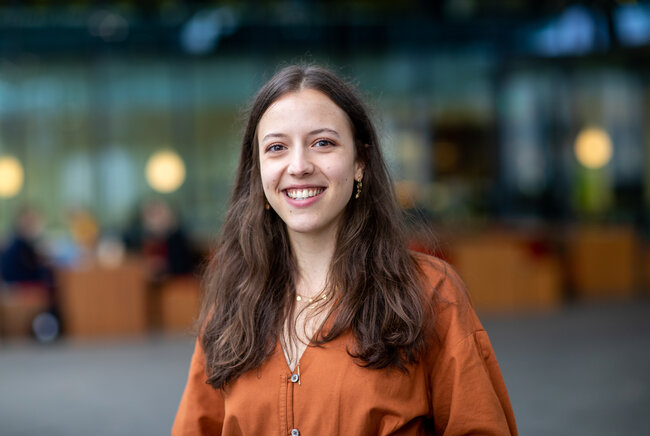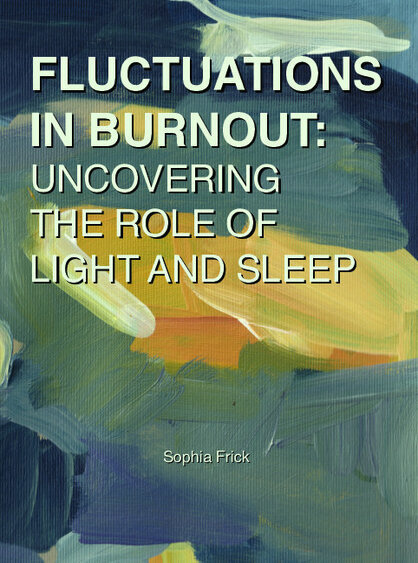How light and sleep quality affect burnout
Sophia Frick defended her PhD thesis at the Department of Industrial Engineering and Innovation Sciences on September 6th.

Burnout is becoming increasingly common with many people reporting that they feel exhausted and detached from their work. Mild symptoms related to burnout are probably familiar to us all: most of us have moments, days, or even weeks during which we feel more exhausted and less engaged in our work than usual. Past research has shown that sleep helps us to recover from work, and that light regulates our sleep patterns, and affects our energy and mood throughout the day. Similarly, getting good quality sleep and the right amount of light may be important for reducing or preventing mild burnout symptoms, whereas poor sleep and insufficient light could worsen such symptoms. The focus of Sophia Frick’s PhD research was to investigate if and how sleep and light contribute to, and could potentially be used to mitigate, the experience and development of mild burnout-related symptoms.
Do burnout symptoms fluctuate throughout the day and week?
Although clinical burnout has traditionally been viewed as a phenomenon that does not change much over time, the PhD research of explored whether mild burnout-related experiences fluctuate from moment to moment and day to day.
First, along with her collaborators at the Department of of Industrial Engineering and Innovation Sciences, Frick repeatedly asked 65 participants to report how burnt-out they felt while working during their regular routine.
Findings from this part of her research showed that burnout-related experiences indeed fluctuate from moment to moment in working participants.
Energy levels peaked around midday and decreased towards the evening, suggesting that our most demanding work tasks should perhaps be tackled before noon.

What comes first: bad sleep or burnout?
When we sleep poorly, we often wake up in a bad mood and with low levels of energy. However, when we feel stressed from work and exhausted, this can also affect how well we sleep at night.
To understand which comes first (poor sleep or burnout), Frink then conducted a one-week field study involving 72 participants in which she employed surveys and wrist-worn sensors to monitor sleep. She found that poor sleep appears to precede burnout-related experiences, not the other way around.
Additionally, Frick found that a poor night’s sleep affects everyone differently: those experiencing high levels of burnout the previous months were more affected by sleeping poorly. This suggests that obtaining good quality sleep may be particularly important for those who are already (susceptible to) feeling burnt-out.
In addition, she was also interested in investigating relationships between sleep and burnout across longer periods of time. For this study, 150 people took part and the whole study lasted 12 months. Participants were repeatedly assessed over the course of the study.
Results from this longitudinal study showed that when participants felt more detached from their work they had more disturbed sleep three months later. Yet, when participants had more disturbed sleep, they experienced more exhaustion three months later.
Poor sleep may thus be one of the mechanisms whereby burnout worsens over time, suggesting that sleep health may help increase resilience against burnout.
Light and burnout
In addition to helping us to see, light is one of the most important factors determining many of our daily rhythms, including when we feel alert and when get sleepy.
In this part of her PhD research, Frick was interested in knowing whether light also influences burnout-related symptoms.
When people were exposed to more intense/brighter light (than they are used to normally during the day), she found that they felt less exhausted at the end of the hour. Basically, being in brighter light than usual for one hour made people feel less exhausted than they did before being in the brighter light.
In addition, Frick also uncovered that while light may be a helpful tool for reducing exhaustion at work for everyone. Light was particularly important for those who already felt burnt-out.
Overall, Frick’s findings suggest that improving sleep quality and ensuring adequate light exposure, could be effective strategies for preventing and managing burnout, particularly for those who are already vulnerable.
Importance and motivation
For Frick, working on this topic was easy to relate to. “We all experience work stress every once in a while, and we have all felt the consequences of not sleeping well. I really appreciated that this research is relevant to so many people and has the potential to contribute to enhancing employee wellbeing and sustainable employment – topics I find very important.”
Added to that, the interdisciplinary nature of the project combined several topics that Frick is interested in. “I have a background in cognitive neuroscience, so I enjoyed linking psychology to more biological and physiological processes via sleep and light. I also appreciated the societal relevance and applied value of the project.”
Be adaptable
During any PhD project, there are key lessons to be learned with regards to content and the research process. For Frick, she learned that the key is to be adaptable.
“Many things do not go as planned (e.g., COVID-19). It is important not to be deterred by that but to find ways to work with and around it,” says Frick. “This may mean that the end result looks a bit different than originally planned, but can also lead to new and unexpected insights.”
Title of PhD-thesis: . Supervisors: Karin Smolders (������ý), Leander van der Meij (������ý), Evangelia Demerouti (������ý), and Yvonne de Kort (������ý).